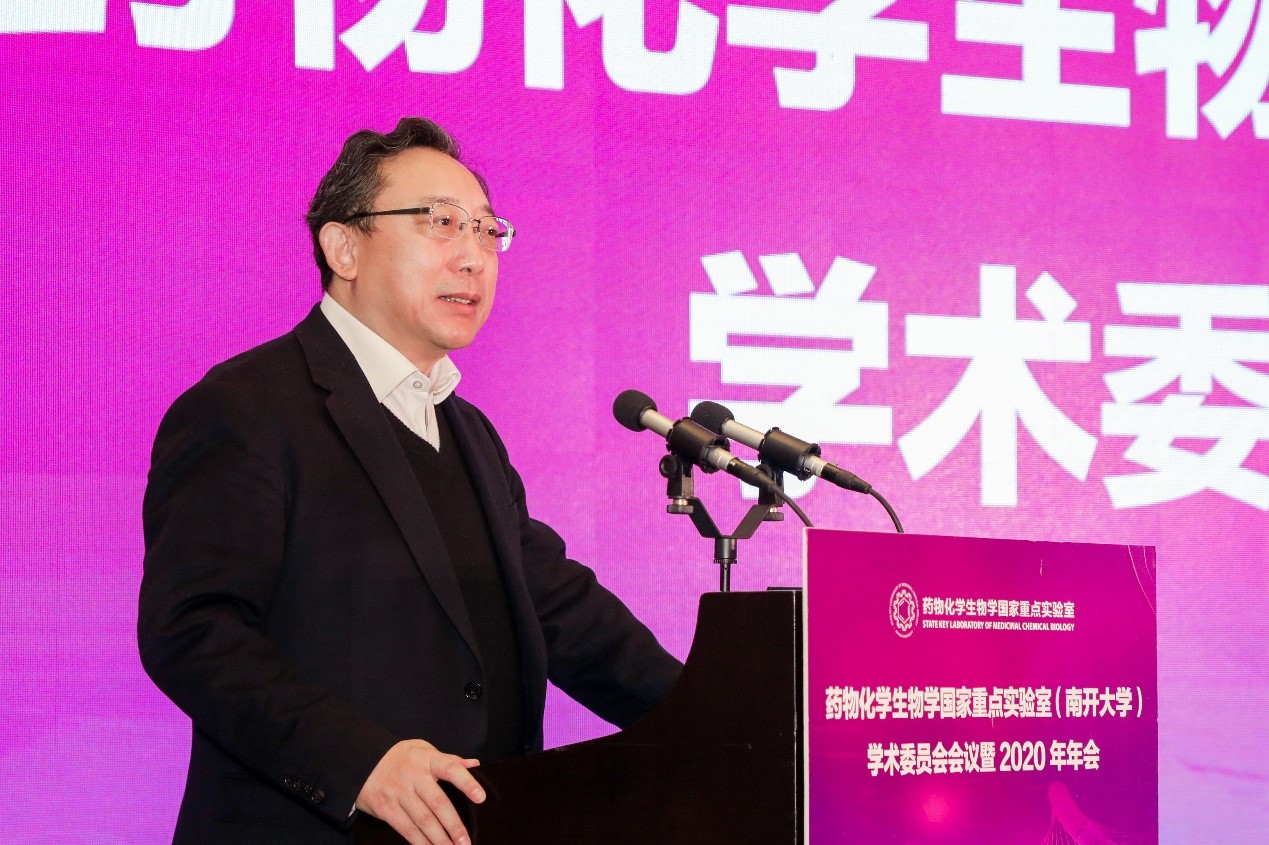The Academic Committee Meeting and the 2020 Annual Meeting of the State Key Laboratory of Medicinal Chemical Biology (Nankai University) (hereafter referred to as State Key Laboratory) were held in Tianjin from December 27-28, 2020. The meeting aimed to summarize the development and experience of the State Key Laboratory, to discuss in-depth the direction for future development as well as long-term plan, and provide an academic exchange platform for scientific researchers.
The meeting was attended by the heads of the scientific research department of Nankai University and many distinguished guests, including Cao Xuetao, academician of the Chinese Academy of Engineering and President of Nankai University; Chen Jun, academician of the Chinese Academy of Sciences and Vice President of Nankai University; Rao Zihe, Zhang Lihe, Chen Hongyuan, Yan Xiyun, Guo Zijian, Hao Xiaojiang, members of the Academic Committee of the State Key Laboratory and academicians of the Chinese Academy of Sciences; Professor Yao Zhi, Secretary of the Party Committee of Tianjin Medical University; Du Guanhua, researcher of the Institute of Materia Medica, Chinese Academy of Medical Sciences; Xi Zhen, Professor of the College of Chemistry, Nankai University; Chen Peng, Professor of the College of Chemistry and Molecular Engineering, Peking University; Wang Jiangyun, researcher of the Institute of Biophysics, Chinese Academy of Sciences; and Du Quansheng, Director of the third division of the Interdisciplinary Studies Department of NSFC.
In his opening speech, Cao Xuetao welcomed the academicians and experts present at the meeting, and expressed his gratitude to the committee members and industry colleagues for their long-term care and support for the State Key Laboratory. President Cao said that in the past year, the State Key Laboratory had played an important role and made new breakthroughs in research on epidemic prevention and control as well as achieved remarkable results in such aspects as scientific research innovation, talent training and cooperative mechanism reform. In the new era, the State Key Laboratory would implement the "Four Orientations" put forward by General Secretary Xi Jinping on scientific and technological innovation, especially in terms of the new requirements for people's life and health, and make greater achievements via precise efforts and gathered intelligence. Nankai University has gone all out to develop the State Key Laboratory. President Cao hoped that all committee members and experts would continue to give their guidance and support, as well as indicate directions for the future development of the laboratory.

Chen Quan, the Director of the State Key Laboratory, made the annual work report of 2020 at the meeting. He introduced many aspects of the State Key Laboratory, including the history, research direction, team building and academic atmosphere, scientific research progress, platform and laboratory management, supporting organizations and key points of future work. The Third Meeting of the Second Academic Committee of State Key Laboratory held at the same time reviewed the work report of the State Key Laboratory in 2020 and indicated the future development of the laboratory.

At the annual meeting, Rao Zihe delivered an invited report entitled "From ‘SARS’ in 2003 to ‘New Coronavirus’ in 2020-Research on SARS-CoV-2 Replication and Transcription Complex". He introduced the research progress of his team on coronaviruses such as SARS and COVID-19 since 2003, shared the three-dimensional structure of multiple key protein/protein complexes in the core process of the SARS-CoV-2 life cycle, and clarified the precise molecular mechanisms underlying processes such as pathogen infection, replication and pathogenicity.

Zhu Yongqun, Professor of the Life Sciences Institute of Zhejiang University delivered an achievement report entitled "Bacterial Infection, Tumor Microbiology and Beyond". Researchers Xue Xue, Chen Yao and Shuai Ling also respectively delivered academic reports entitled “Diagnosis and Treatment of Brain Diseases with Nanomaterials”, “Localized Precise Fixation and Platform Application of Biomacromolecules” and “High-throughput screen in post-implantation haploid epiblast stem cells reveals Hs3st3b1 as a modulator for reprogramming”. Researchers from the State Key Laboratory made work reports separately.
Finally, a seminar on the development strategy of the State Key Laboratory and the award ceremony for excellent posters presented at the annual meeting were also held. The researchers and students of the State Key Laboratory conducted academic exchanges and discussions on related topics.

